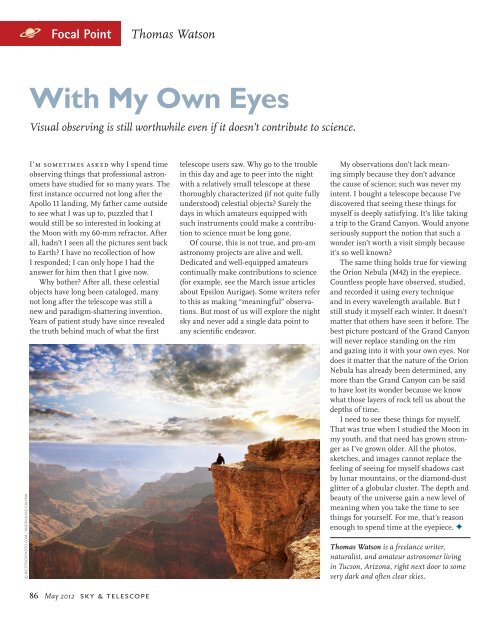Download this ebook as PDF - E-Book Library
Download this ebook as PDF - E-Book Library
Download this ebook as PDF - E-Book Library
Create successful ePaper yourself
Turn your PDF publications into a flip-book with our unique Google optimized e-Paper software.
© BIGSTOCKPHOTO.COM / ANDRUSHKO GALYNA<br />
Focal Point Thom<strong>as</strong> Watson<br />
With My Own Eyes<br />
Visual observing is still worthwhile even if it doesn’t contribute to science.<br />
I’m sometimes <strong>as</strong>ked why I spend time<br />
observing things that professional <strong>as</strong>tronomers<br />
have studied for so many years. The<br />
fi rst instance occurred not long after the<br />
Apollo 11 landing. My father came outside<br />
to see what I w<strong>as</strong> up to, puzzled that I<br />
would still be so interested in looking at<br />
the Moon with my 60-mm refractor. After<br />
all, hadn’t I seen all the pictures sent back<br />
to Earth? I have no recollection of how<br />
I responded; I can only hope I had the<br />
answer for him then that I give now.<br />
Why bother? After all, these celestial<br />
objects have long been cataloged, many<br />
not long after the telescope w<strong>as</strong> still a<br />
new and paradigm-shattering invention.<br />
Years of patient study have since revealed<br />
the truth behind much of what the fi rst<br />
86 May 2012 sky & telescope<br />
telescope users saw. Why go to the trouble<br />
in <strong>this</strong> day and age to peer into the night<br />
with a relatively small telescope at these<br />
thoroughly characterized (if not quite fully<br />
understood) celestial objects? Surely the<br />
days in which amateurs equipped with<br />
such instruments could make a contribution<br />
to science must be long gone.<br />
Of course, <strong>this</strong> is not true, and pro-am<br />
<strong>as</strong>tronomy projects are alive and well.<br />
Dedicated and well-equipped amateurs<br />
continually make contributions to science<br />
(for example, see the March issue articles<br />
about Epsilon Aurigae). Some writers refer<br />
to <strong>this</strong> <strong>as</strong> making “meaningful” observations.<br />
But most of us will explore the night<br />
sky and never add a single data point to<br />
any scientifi c endeavor.<br />
My observations don’t lack meaning<br />
simply because they don’t advance<br />
the cause of science; such w<strong>as</strong> never my<br />
intent. I bought a telescope because I’ve<br />
discovered that seeing these things for<br />
myself is deeply satisfying. It’s like taking<br />
a trip to the Grand Canyon. Would anyone<br />
seriously support the notion that such a<br />
wonder isn’t worth a visit simply because<br />
it’s so well known?<br />
The same thing holds true for viewing<br />
the Orion Nebula (M42) in the eyepiece.<br />
Countless people have observed, studied,<br />
and recorded it using every technique<br />
and in every wavelength available. But I<br />
still study it myself each winter. It doesn’t<br />
matter that others have seen it before. The<br />
best picture postcard of the Grand Canyon<br />
will never replace standing on the rim<br />
and gazing into it with your own eyes. Nor<br />
does it matter that the nature of the Orion<br />
Nebula h<strong>as</strong> already been determined, any<br />
more than the Grand Canyon can be said<br />
to have lost its wonder because we know<br />
what those layers of rock tell us about the<br />
depths of time.<br />
I need to see these things for myself.<br />
That w<strong>as</strong> true when I studied the Moon in<br />
my youth, and that need h<strong>as</strong> grown stronger<br />
<strong>as</strong> I’ve grown older. All the photos,<br />
sketches, and images cannot replace the<br />
feeling of seeing for myself shadows c<strong>as</strong>t<br />
by lunar mountains, or the diamond-dust<br />
glitter of a globular cluster. The depth and<br />
beauty of the universe gain a new level of<br />
meaning when you take the time to see<br />
things for yourself. For me, that’s re<strong>as</strong>on<br />
enough to spend time at the eyepiece. ✦<br />
Thom<strong>as</strong> Watson is a freelance writer,<br />
naturalist, and amateur <strong>as</strong>tronomer living<br />
in Tucson, Arizona, right next door to some<br />
very dark and often clear skies.


